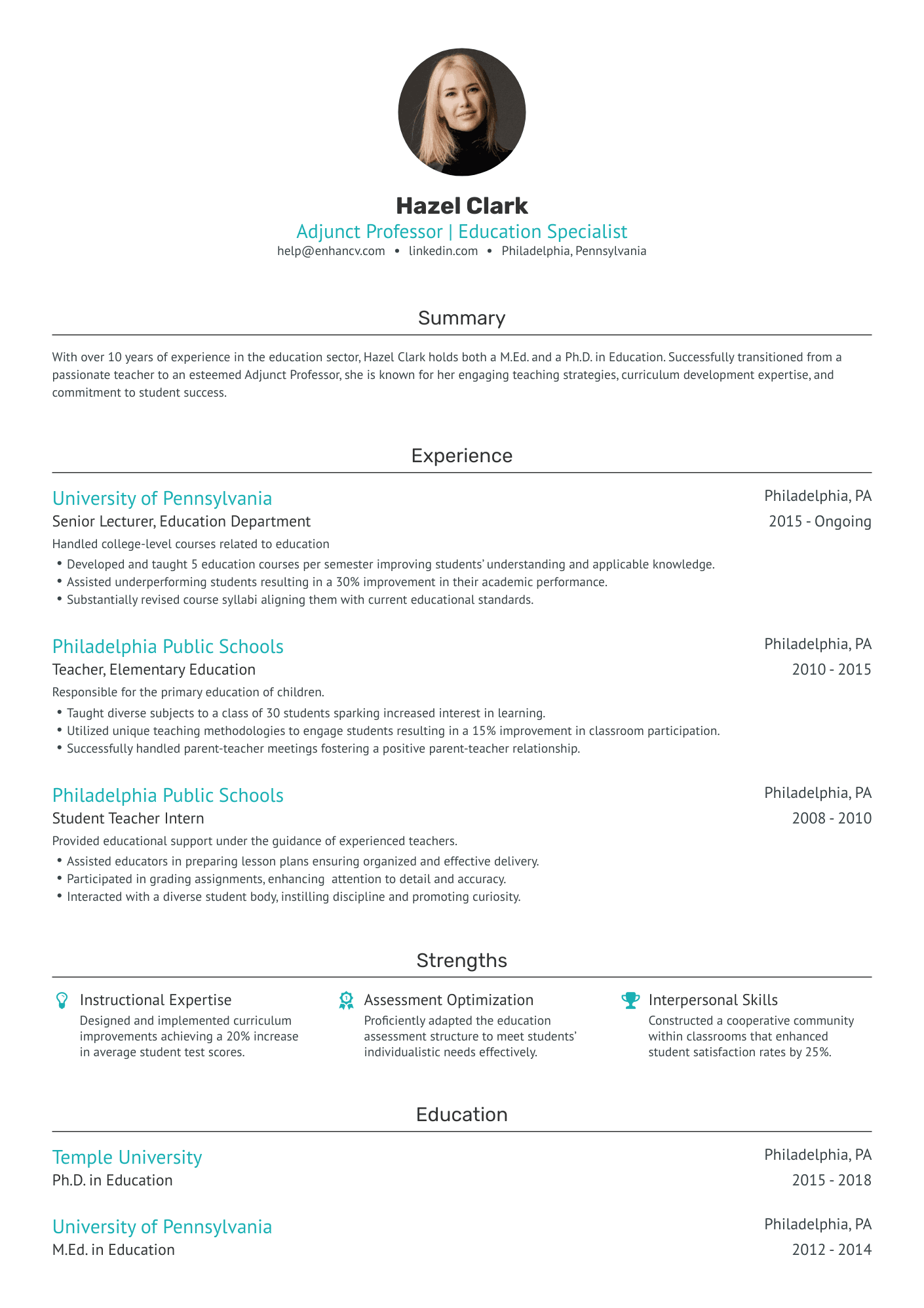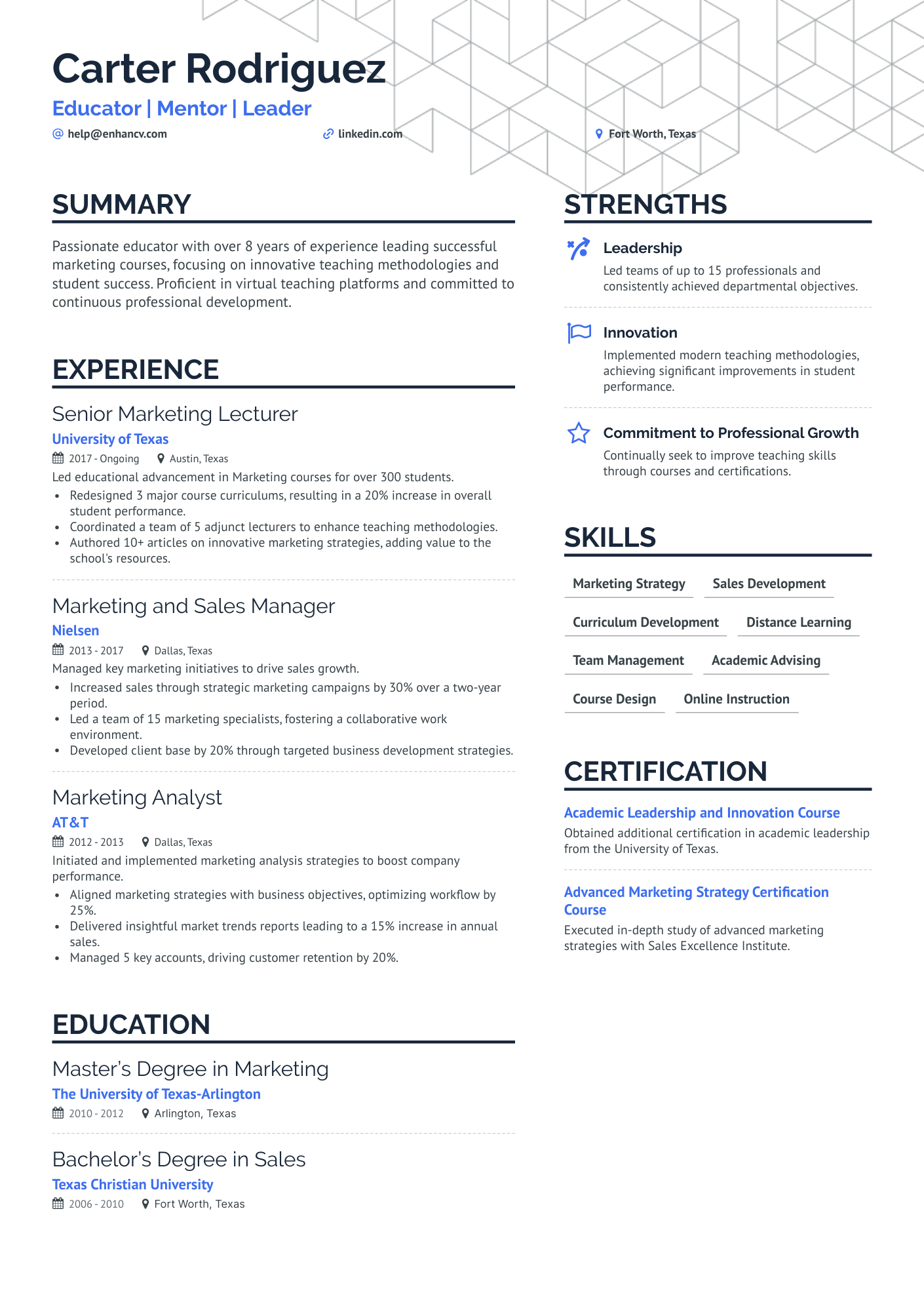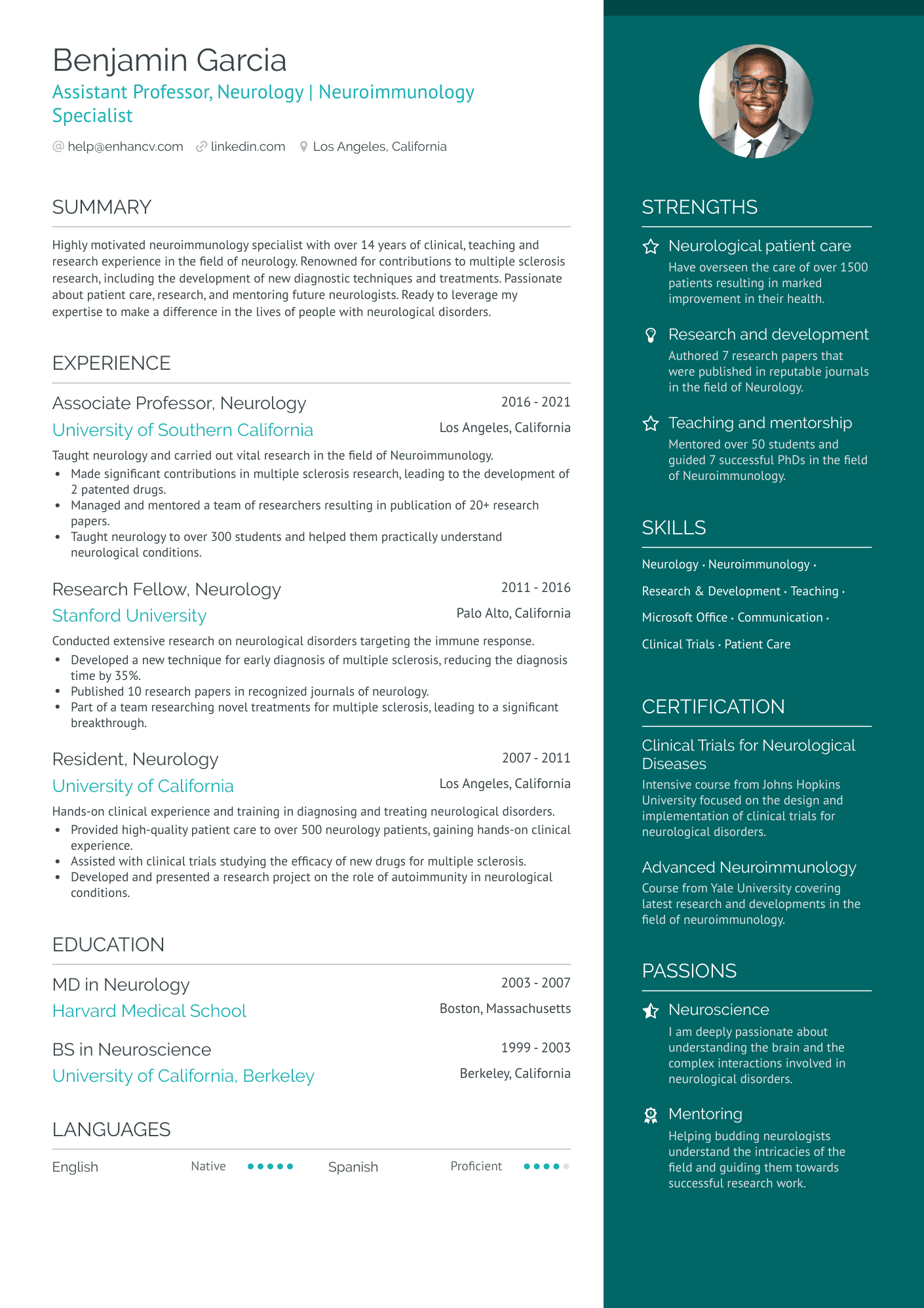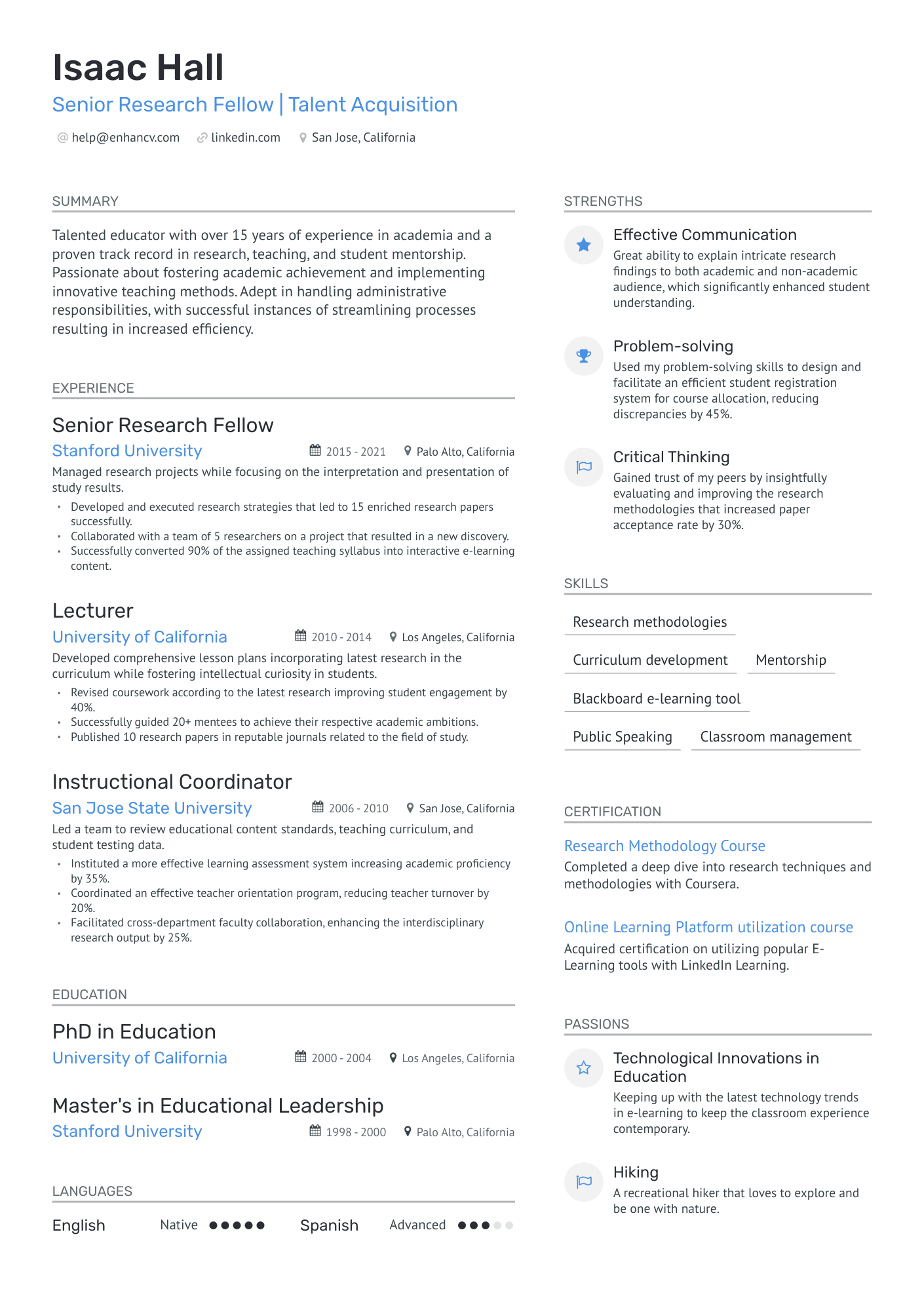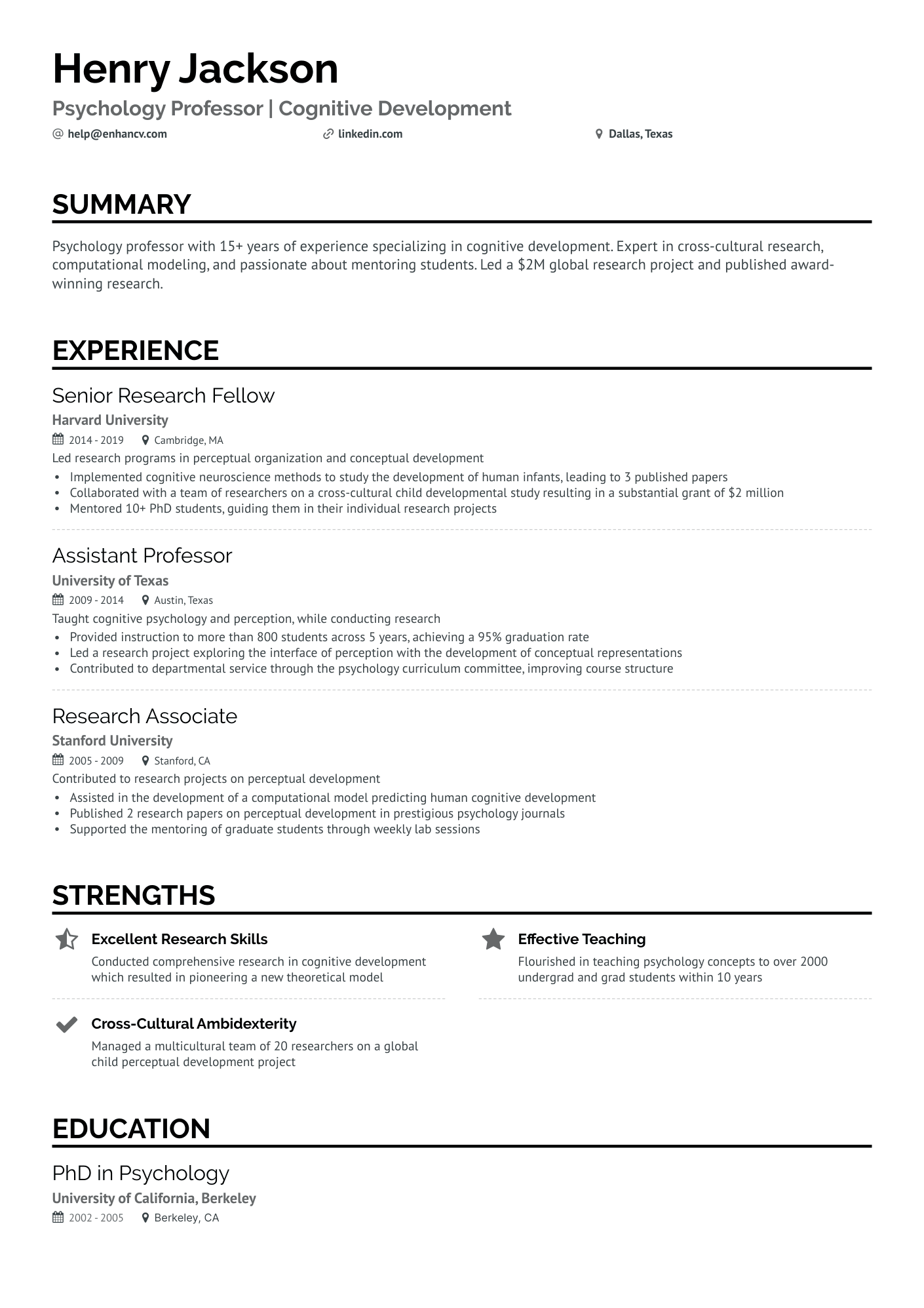As a professor, you may struggle to condense a lengthy publication list and diverse academic experiences into a succinct resume. Our guide offers expert strategies to help you highlight your most impactful work and tailor your resume for maximum clarity and relevance.
- Aligning the top one-third of your professor resume with the role you're applying for.
- Curating your specific professor experience to get the attention of recruiters.
- How to list your relevant education to impress hiring managers recruiting for the professor role.
Discover more professor professional examples to help you write a job-winning resume.
- Math Teacher Resume Example
- Science Teacher Resume Example
- Teacher For Career Change Resume Example
- Sunday School Teacher Resume Example
- Online Teacher Resume Example
- Distance Learning Teacher Resume Example
- Bilingual Teacher Resume Example
- Dance Teacher Resume Example
- High School Teacher Resume Example
- Pre K Teacher Resume Example
Tips and tricks for your professor resume format
Before you start writing your resume, you must first consider its look-and-feel - or resume format . Your professional presentation hence should:
- Follow the reverse-chronological resume format , which incroporates the simple logic of listing your latest experience items first. The reverse-chronological format is the perfect choice for candidates who have plenty of relevant (and recent) experience.
- State your intention from the get-go with a clear and concise headline - making it easy for recruiters to allocate your contact details, check out your portfolio, or discover your latest job title.
- Be precise and simple - your resume should be no more than two pages long, representing your experience and skills that are applicable to the professor job.
- Ensure your layout is intact by submitting it as a PDF. Thus, your resume sections would stay in place, even when assessed by the Applicant Tracker System (ATS).
Upload & Check Your Resume
Drop your resume here or choose a file. PDF & DOCX only. Max 2MB file size.
PRO TIP
If you happen to have plenty of certificates, select the ones that are most applicable and sought-after across the industry. Organize them by relevance to the role you're applying for.
Essential sections that should make up your professor resume include:
- The header - with your contact details (e.g. email and telephone number), link to your portfolio, and headline
- The summary (or objective) - to spotlight the peaks of your professional career, so far
- The experience section - with up to six bullets per role to detail specific outcomes
- The skills list - to provide a healthy mix between your personal and professional talents
- The education and certification - showing your most relevant degrees and certificates to the professor role
What recruiters want to see on your resume:
- Academic Qualifications: Ph.D. in a relevant field.
- Teaching Experience: Courses taught and teaching evaluations.
- Research Accomplishments: Publications, research grants, and projects.
- Academic Service: Committee work, program development, and administrative roles.
- Professional Affiliations and Awards: Membership in professional societies and recognition within the academic community.
The professor resume experience section: a roadmap to your expertise
The resume experience section provides you with an opportunity to tell your professional narrative.
Recruiters, reading between the lines of your resume, use the experience section to better understand your unique skill set, accomplishments, and what unique value you bring about.
Discover five quick steps on how to write your experience section:
- Curate only relevant experience items to the role and include the company, description, and dates; all followed by up to six bullets per experience item;
- Each experience item should feature tangible results of your actions - if you can include a number or percent, this will further highlight your aptitude;
- If you've received any managerial or customer feedback, use short excerpts of it as further social proof of your technical or people skills;
- Make sure you're using the appropriate verb tense when listing your responsibilities;
- Within the description for each role, you could summarize your most noteworthy and relevant achievements.
Now, take note of how a real-world professor professional received opportunities at industry leaders with these resume experience sections:
- Developed and implemented a new curriculum for artificial intelligence, which has increased enrollment in the program by 20%.
- Supervised 15 graduate students' theses, with 5 students going on to receive prestigious academic awards.
- Secured a $500,000 grant for the department to upgrade laboratory equipment, enhancing practical learning opportunities.
- Led a research team in developing a patented energy-efficient engine design that was licensed by a major automotive manufacturer.
- Published over 30 peer-reviewed papers in top-tier journals, increasing the department's academic standing and visibility.
- Created an industry partnership program that fostered relationships with 10 leading engineering firms, facilitating student internships and job placements.
- Spearheaded a department initiative to incorporate more real-world case studies into the curriculum, improving student engagement by 25%.
- Advised the college's investment club, which under my guidance grew its portfolio by 35% in three years.
- Collaborated with colleagues to organize an annual economic symposium that drew over 500 international attendees.
- Designed and launched an interdisciplinary course on bioinformatics that bridged the gap between biology and computer science departments.
- Collaborated with a biotech company to provide students with hands-on experience, resulting in an employment rate of 90% for participating students.
- Secured $250,000 in funding for the development of a new computational lab dedicated to genomics research.
- Coordinated with multiple departments to introduce a cross-disciplinary project-based learning initiative that improved student software development skills.
- Provided consultancy for the university's IT infrastructure overhaul, which improved the network reliability by 40%.
- Structured industry partnerships leading to the donation of state-of-the-art hardware for our IT labs.
- Led a major longitudinal study on climate change impacts on local ecosystems, which influenced regional conservation policies.
- Managed a multidisciplinary research team of 20+ individuals resulting in three impactful publications in high-impact journals.
- Developed a community outreach program that educated over 1000 local participants on sustainable practices.
- Leveraged expertise in sociological research to integrate current events into the classroom, significantly increasing student critical thinking skills.
- Established a mentoring program for at-risk youth in the community, contributing to a decrease in local juvenile delinquency rates.
- Authored a textbook currently used by over 50 universities nationwide, promoting progressive teaching methods in sociology.
- Pioneered a new digital learning platform for physics courses, improving average exam scores by 15%.
- Collaborated on a multi-year research project that yielded groundbreaking findings on quantum computing applications.
- Organized and hosted an international conference on theoretical physics, solidifying the university's reputation in the field.
Quantifying impact on your resume
- Include the number of publications you have authored or co-authored to demonstrate research productivity and influence in your field.
- List the total amount of grant funding you have secured, showcasing your ability to attract investment for research and projects.
- Quantify the size of classes or courses taught, emphasizing your experience and effectiveness in managing and delivering education to large groups.
- State the precise number of students you have supervised for their theses or dissertations, showing your mentorship and impact on future professionals.
- Highlight the number of conference presentations or talks given, which can illustrate your active participation and recognition in academic circles.
- Include the citation metrics for your most cited works to highlight the reach and impact of your research within the academic community.
- Mention the number of awards or honors received, underscoring your excellence and reputation in your academic field.
- Detail the number of professional societies you are a member of, as well as any leadership positions held, to reflect your engagement in the academic community.
Action verbs for your professor resume
Experience section for candidates with zero-to-none experience
While you may have less professional experience in the field, that doesn't mean you should leave this section of your resume empty or blank.
Consider these four strategies on how to substitute the lack of experience with:
- Volunteer roles - as part of the community, you've probably gained valuable people (and sometimes even technological capabilities) that could answer the job requirements
- Research projects - while in your university days, you may have been part of some cutting-edge project to benefit the field. Curate this within your experience section as a substitute for real-world experience
- Internships - while you may consider that that summer internship in New York was solely mandatory to your degree, make sure to include it as part of your experience, if it's relevant to the role
- Irrelevant previous jobs - instead of detailing the technologies you've learned, think about the transferable skills you've gained.
Recommended reads:
PRO TIP
Highlight any significant extracurricular activities that demonstrate valuable skills or leadership.
Featuring your hard skills and soft skills on your professor resume
The skills section of your professor resume needs to your various capabilities that align with the job requirements. List hard skills (or technical skills) to showcase to potential employers that you're perfectly apt at dealing with technological innovations and niche software. Meanwhile, your soft skills need to detail how you'd thrive within your new, potential environment with personal skills (e.g. resilience, negotiation, organization, etc.) Your professor resume skills section needs to include both types of skills to promote how you're both technical and cultural fit. Here's how to create your bespoke professor skills section to help you stand out:
- Focus on skill requirements that are listed toward the top of the job advert.
- Include niche skills that you've worked hard to obtain.
- Select specific soft skills that match the company (or the department) culture.
- Cover some of the basic job requirements by including important skills for the professor role - ones you haven't been able to list through the rest of your resume.
Get inspired with our professor sample skill list to list some of the most prominent hard and soft skills across the field.
Top skills for your professor resume:
Subject Matter Expertise
Curriculum Development
Research Proficiency
Academic Writing
Grant Writing
Data Analysis
Educational Technology
Lecture Planning
Scientific Publishing
Assessment Creation
Communication
Public Speaking
Critical Thinking
Mentorship
Leadership
Time Management
Organization
Collaboration
Adaptability
Problem Solving
PRO TIP
List all your relevant higher education degrees within your resume in reverse chronological order (starting with the latest). There are cases when your PhD in a particular field could help you stand apart from other candidates.
How to include your education and certifications on your resume
We're taking you back to your college days with this part of our guide, but including your relevant higher education is quite important for your resume.
Your degree shows recruiters your dedication to the industry, your recent and relevant know-how, and some form of experience in the field.
Your professor resume education should:
- Include your applicable degrees, college (-s) you've graduated from, as well as start and end dates of your higher education;
- Skip your high school diploma. If you still haven't graduated with your degree, list that your higher education isongoing;
- Feature any postgraduate diplomas in your resume header or summary - this is the perfect space to spotlight your relevant MBA degree;
- Showcase any relevant coursework, if you happen to have less professional experience and think this would support your case in being the best candidate for the role.
As far as your job-specific certificates are concerned - choose up to several of the most recent ones that match the job profile, and include them in a dedicated section.
We've saved you some time by selecting the most prominent industry certificates below.
The top 5 certifications for your professor resume:
- Postgraduate Certificate in Higher Education (PGCHE) - Various universities
- Graduate Certificate in College Teaching (GCCT) - Various universities
- Certificate of Professional Development in Higher Education Teaching (CPDHET) - Various professional development institutes
- Higher Education Teaching Certificate (HETC) - Harvard University
- Certificate in University Teaching and Learning (CUTL) - Various universities
PRO TIP
If you failed to obtain one of the certificates, as listed in the requirements, but decide to include it on your resume, make sure to include a note somewhere that you have the "relevant training, but are planning to re-take the exams". Support this statement with the actual date you're planning to be re-examined. Always be honest on your resume.
Recommended reads:
Which one to use: a resume summary or a resume objective?
The professor resume summary or objective serves as a good introduction to your experience for recruiters.
Have you ever wondered which one (the summary or objective) will be more appropriate for your professor resume?
- If you are a less experienced professional, write a resume objective statement. The objective is about three sentences long and provides recruiters with information about your career goals, strengths, and achievements . It should basically denote how you see yourself in this particular role, and what is your relevant experience and/or know-how;
- If you happen to have plenty of relevant experience, select your most impressive achievements for your resume summary. The summary is no longer than five sentences and serves as a storytelling instrument - highlighting your greatest career wins . Don't forget to align your summary with the job requirements to ensure your resume stays relevant to the role.
Read on for more information and examples of resume summaries and objectives from real world professionals.
Resume summaries for a professor job
- With over 15 years of dedicated experience teaching psychology at the university level, I have successfully published 25 peer-reviewed articles and mentored over 150 graduate students to completion. Expert in cognitive-behavioral research with accolades for my contribution to understanding human behavior.
- Seasoned Chemistry Professor with a Ph.D. from MIT and a track record of over 20 years in academia, specializing in organic synthesis. Renowned for securing a $2 million research grant and developing a novel pharmaceutical compound embraced by industry leaders.
- Accomplished executive with 10 years in the technology sector, now transitioning into academia with a focus on teaching IT management. Holds an MBA from Harvard and recognized for designing and implementing innovative cloud-based solutions that transformed business practices.
- Professional architect with 12 years of industry success, seeking to bring practical experience to architectural education. Notable for award-winning sustainable design projects and for driving cross-disciplinary collaborations between engineers and environmental scientists.
- Aspiring academic with a deep passion for Medieval Literature, committed to contributing fresh insights through rigorous research and engaging teaching methods. Eager to leverage my Master's degree from Oxford and fluency in Latin to inspire a new generation of scholars.
- Highly motivated Linguistics graduate with notable academic performance and a promising research profile, aiming to join a dynamic Language Studies department. Keen to utilize strong analytical skills and a multilingual background to contribute to advancing understanding of language acquisition.
Taking your professor resume to the next level with these four additional resume sections
Your professor resume can feature a variety of skills (both hard and soft) in diverse sections. Choose those that align best with the job requirements and reflect your suitability for the company culture.
Consider these four additional resume sections recommended by our experts:
- Languages - State any languages you are proficient in and your level of proficiency. This demonstrates your commitment to communication and potential for international growth.
- Projects - Highlight up to three significant projects you've completed outside of work, showcasing skill development. Include a link to your project portfolio in the professor resume header, if applicable.
- My Time - How you allocate your time outside work can indicate your organizational skills and cultural fit within the company.
- Volunteering - Detail causes you're passionate about, roles you've held, and achievements in volunteering. Such experiences likely have honed a range of soft skills crucial for your dream job.
Key takeaways
- Ensure your professor resume uses a simple, easy-to-read format that reflects upon your experience and aligns with the role;
- Be specific within the top one-third of your resume (header and summary or objective) to pinpoint what makes you the ideal candidate for the professor role;
- Curate information that is tailored to the job by detailing skills, achievements, and actual outcomes of your efforts;
- List your certifications and technical capabilities to demonstrate your aptitude with specific software and technologies;
- The sections you decide on including on your professor should pinpoint your professional expertise and personality.
Professor resume examples
Explore additional professor resume samples and guides and see what works for your level of experience or role.
By Role
